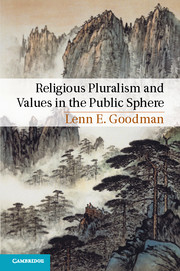2 - Naked in the Public Square
Published online by Cambridge University Press: 05 June 2014
Summary
Time was when organizers of a public meeting were happy if people checked their weapons at the door. But in the charged atmosphere of the decades since Roe v. Wade, self-described liberals may expect those who deliberate on public policy matters to check their ideas too. As Gerald Mara writes, “A number have embraced pluralism not merely as a phenomenon to be recognized within any competent practical philosophy, but also as confirmation of a deeper suspicion that concern with virtue is somehow implausible or illegitimate within political theory.” Behind that concern lurks the idea that pluralism itself demands that the state stay silent regarding the character of its citizenry or, indeed, any areas that touch on conscience or fundamental values. But in a democracy all citizens are members of the state, whether active or passive. From that concept stems the thought that in a democracy everyone should not just refrain from doing harm to others but also keep out of others’ moral and intellectual space.
In recent years, the work of John Rawls has come to dominate much of the discourse of political theory and political philosophy for reasons not hard to understand. As Robert Nozick, a colleague and rival of Rawls's, writes,
A Theory of Justice is a powerful, deep, subtle, wide-ranging, systematic work in political and moral philosophy which has not seen its like since the writings of John Stuart Mill, if then. It is a fountain of illuminating ideas, integrated together into a lovely whole. Political philosophers now must either work within Rawls's theory or explain why not.
- Type
- Chapter
- Information
- Religious Pluralism and Values in the Public Sphere , pp. 54 - 101Publisher: Cambridge University PressPrint publication year: 2014



